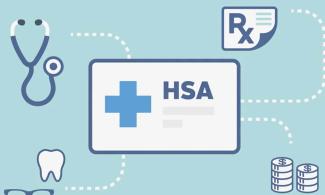
Heath Savings Accounts: A Retirement Savings Alternative
For those who have maxed out contributions in qualified retirement plans (401(k), 403(b), 457, etc.) and IRAs, there may be another alternative to consider when saving for retirement – a Health Savings Account (HSA).
Before diving into the many benefits of opening an HSA, it should be noted that one can only be eligible if enrolled in a high-deductible health plan. For 2019, the insurance plan must have a deductible of at least $1,350 for individuals and $2,700 for families. If one meets this requirement, an HSA can be another powerful tool in your arsenal of savings.
Below are a few of the benefits of saving into an HSA.
The Triple Tax Advantage of an HSA
Contributing into an HSA offers tax benefits during three different time periods: a tax deduction in the year of contribution, tax-deferred growth, and a tax-free distribution if funds are used to pay for qualified medical expenses.
Investing HSA Contributions
If one is still healthy with little to no medical expenses, HSA contributions can be invested to provide some level of growth. Should a major medical expense occur at some point in the future, this nest egg can be used to pay for such an expense and eliminate the worry of how to pay for it. Investing, of course, leads to a different conversation dependent on risk tolerances, time horizons, expected use of these funds, etc. of an individual.
HSA’s during retirement
In addition to paying for qualified medical expenses, HSA’s can be used for several expenses, such as:
- COBRA Health Plan Premiums – If one is using a COBRA plan to bridge the gap until eligible for Medicare, HSA funds can be used to pay for these premiums.
- Long-Term Care Policy Premiums – As premiums for Long-Term Care policies continue to rise, HSA funds can be used to cover a portion of this expense. However, the amount that may be distributed is based on age. For 2019, these figures are:
- Below age 40 = $420
- Ages 41-50 = $790
- Ages 51-60 = $1,580
- Ages 61-70 = $4,220
- Age 71+ = $5,270
- Non-medical Distributions – Once an individual turns 65, they may take distributions for non-qualified medical expenses without facing a tax penalty. However, the tax-free benefit will be lost on such a distribution and will have to pay ordinary income taxes on it.
- No Required Minimum Distributions – Just like a Roth IRA, there are no RMD rules for an HSA. If funds in this account are not completely used, they may be inherited. Spouses who inherit an HSA will still be eligible to take tax-free distributions for qualified medical expenses. However, a non-spouse beneficiary will find that an HSA will lose its status and its funds will be taxable to the beneficiary.
In many ways, HSA’s are similar to a typical IRA or Roth IRA. Depending on an individual’s situation, HSA’s can be a useful savings and planning tool. Discussing this further with your financial planner can help clarify if this right for you.
Weingarten Associates is an independent, fee-only Registered Investment Advisor in Lawrenceville, New Jersey serving Princeton, NJ as well as the Greater Mercer County/Bucks County region. We make a difference in the lives of our clients by providing them with exceptional financial planning, investment management, and tax advice.

